It's more critical than ever for your house to stand out in the current market. Making an effort with the "packaging" will result in a stronger first impression, which generates more offers and speeds up the sale. It is the main goal of house staging.
As home stagers, we draw attention to a home's best features so that potential buyers see them right away while also establishing a welcoming, comfortable atmosphere. Making your home as desirable as you can increases the likelihood that buyers will feel confident enough to submit an offer on it.
We've put together this beginner's guide to home staging to offer you a fast explanation of how it works, why it is so powerful, and how to use it to help sell your home if you're new to it or have questions about how it all works.
Understanding your customer is essential before trying to sell anything.
It's the same when selling a house. Indeed, most people's purchase of a home represents the largest purchase they will ever make, so several considerations influence their choice.
The idea behind home staging is the same as that used by product creators, who spend a lot of time, money, and effort packaging their goods in a way that appeals to customers.
Consider yourself the prospective homeowner. They are under a lot of pressure to spend their money wisely and are looking at a ton of residences.
In addition to practical considerations, there are a lot of emotional ones as well. House staging goes beyond simply displaying a home's advantages and makes it seem like home, allowing purchasers to form an emotional connection and feel secure in their financial decision.
You want a buyer to focus on the advantages of your house.
Family photos, personalized decor, and clutter are all major distractions.
Though it would be ideal if purchasers could see past these issues, the majority of them can't.
Family photos make most buyers uncomfortable because they remind them that they are walking through someone else's private home, clutter makes homes feel small and claustrophobic, and personalized decor can be off-putting if the buyers don't share the same tastes (and makes them think they must invest a lot of money to change it), and personalized decor can be off-putting if the buyers don't share the same aesthetic preferences.
All three of these problems are addressed by home staging. You should start by organizing the entire house. Get rid of everything you don't want (give it or toss it away), then pack the rest away. More so than you would if you were planning on relocating there. The home will feel bigger and more open if there are fewer things about it.
Then, make the décor and color scheme neutral. Get rid of any wallpaper, vividly colored walls, and esthetically distinctive decor. To appeal to the most buyers possible, you should maintain a neutral color scheme and a modern design while staging a home. Just a few bright elements will give it some personality. Buyers will be able to see the house in a lovely light and have the freedom to envision their own decor in its place as a result.
Remove all of your personal belongings, including jewelry, toiletries, and photographs.
You want potential purchasers to consider the house as their own, not someone else's.
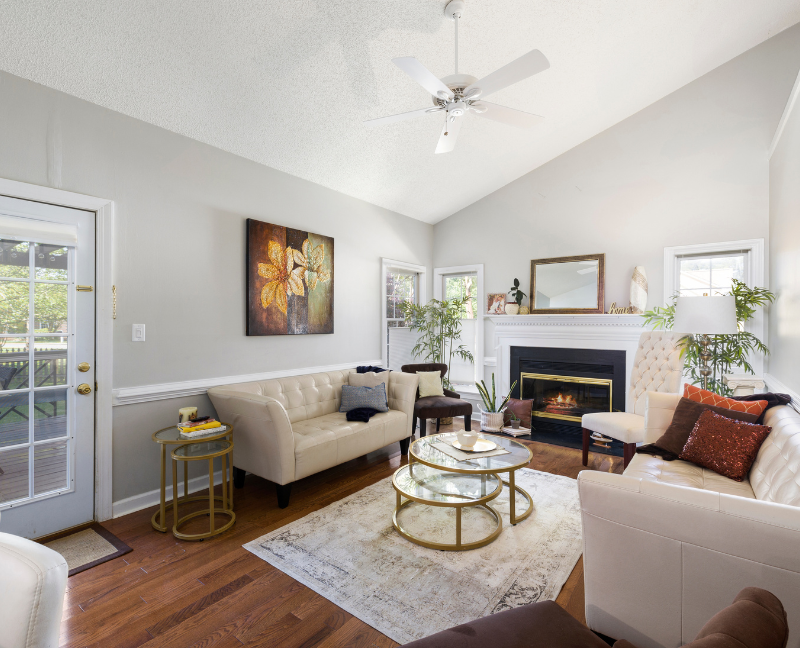
Take care of any necessary repairs before listing your house for sale.
While it may be tempting to pass on minor or even major repairs to the new owner, most house purchasers will see dollar signs and either remove the item from their offer or move on to the next move-in-ready home.
Before beginning to show your home, make sure you thoroughly clean it. We advise hiring specialized cleaners who will use the best tools to reach every nook and corner. After that, continue to maintain it while it is for sale.
It's time to add some unique touches after you've finished all the repairs, cleaned and decluttered, neutralized the color scheme, and de-personalized the decor.
If you've ever visited a model house, you may have seen items like a coffee machine and a set of cups on a tray in the master bedroom or a pair of white robes hanging in the restroom.
These items have a significant influence on a buyer's mentality, therefore they aren't only there for entertainment. Use a handful of these extraneous elements to make customers happy and make them feel like they've found something special.
Do you have other tips when staging a home? If yes, feel free to drop them in the comments.
Thank you!
More than just four walls and a roof make up a house. It stirs up a variety of feelings and ideas inside of us. Some people see it as a sense of security, others as comfort, and yet others as a sign of success and prestige.
The other component of a home, however, must also be taken into consideration. It is related to numbers. The financial side is crucial as well because for the average Indian, purchasing a home is frequently their biggest financial transaction. Many struggle with the question of whether to buy or rent.
Owning a home gives you control over your life. You don't have to deal with a landlord, yet renting is difficult in many ways, whether you need small repairs made or a whole house renovation. For water, power, maintenance, and nearly everything else, you are reliant upon the landlord.
You give your family their very own space—a home—when you buy a house. Returning to your own nest after a long day at work, along with a taxing commute and ongoing stress, awakens a sense of security and comfort that is simply priceless. After all, no place can truly allow you to relax and just be yourself at "home."
The risk of the landlord prematurely terminating the lease agreement does not bring you the same stress and anxiety that it may with your own home. Also, there is no headache associated with having to continuously renegotiate the terms of the rental agreement and renew it each year.
Rent is a cost, and generally speaking, people try to spend less. Hence, you can end up making compromises regarding several factors, including amenities, size, and location. Yet, if you purchase a home, you will make sure that the home you select suits your needs.

Having your ideal home is now simpler thanks to the accessibility of simple financing choices. To save money for your ideal home, you don't have to wait until your 40s and 50s. You can purchase it when you're in your 20s and have a paid-off house by the time you're 50 or even before. Selecting a home loan provider wisely will allow you the flexibility to manage your loan repayment by customizing your EMI to match your current and projected income trends.
You receive enticing tax incentives for paying off your mortgage's principal and interest. Also, keep in mind that the true cost of renting exceeds the amount of rent you pay. Because you do not earn interest on the deposit you pay to the landlord (which can be fairly substantial in high-end locations), your cost is higher.
You might pay the EMI on your home loan rather than paying rent, which is an expense only, and over time, this will help you create your own asset. Your equity in your house increases practically with each EMI that you pay.
It makes sense to purchase a home if you intend to stay in a city for an extended time so that you can feel a sense of permanence and belonging. You become more familiar with the city and its way of life. You believe that your life is now at peace. In addition, property values typically increase with time. By purchasing a property, you are also gradually increasing your wealth. Delaying your real estate purchase will require you to make a larger investment (in addition to having paid rent over an extended time).
And finally, owning a home is a sign of success and achievement in society. The house you own is a good indicator of your wealth and position. Consequently, purchasing a home can greatly raise your social position.
Are you looking for real estate in Indiana? If yes, our top-tier realtors can help! Call us at 317-298-0961 today!
Before you begin the home-buying process, having a fundamental understanding of common real estate terms will immediately provide you peace of mind and could save you a lot of money.
Before starting your home search, you should know the following common real estate terms 101.
Here are the ten common real estate terms you need to know before you proceed in the home-buying process:
When buying a home, the "buyer's agent" represents you, and the "listing agent" means the seller. One agent represents both sides in a dual agency.
Fixed- and adjustable-rate mortgages are conventional loans. The most popular fixed-rate mortgage is 30 years. Most adjustable rate mortgages have a 5, 7, or 10-year term.
The pre-approval letter from a bank, which estimates how much they'll lend you, should be obtained before you apply for a mortgage or even begin looking for a home. This letter will reassure home sellers that you can acquire a loan when necessary and assist you in figuring out what you can afford.
Real estate agents frequently use the term "listings" to refer to homes for sale. A "listing" on a website provides details about a property, such as the selling price and the number of bedrooms and baths.
After making an offer on a home, buyers must plan an inspection, which usually costs $500–$800, depending on the housing market. The inspector will inspect everything, including the plumbing, electrical, foundation, walls, etc.

Your lender will want an appraisal of the house you intend to buy once you apply for a mortgage. A certified appraiser will estimate the home's value using comparable properties recently sold in the neighborhood and examine the property.
As part of your offer to buy a home, you can include contingencies, which must be met before closing.
The following are some typical examples of contingencies:
In addition, there are many additional kinds of contingent clauses, all of which you and your real estate agent ought to discuss.
Your agent or attorney will assist you in making an offer on the right home. If the seller counters your offer, they normally would like more money or a faster closing date, so you'll have to negotiate. To modify your offer, include a cover letter explaining why you want to purchase the home.
Homebuyers might expect high fees. Closing costs, excluding the down payment, average 2-5% of the home's purchase price. Excise tax, loan processing, and title insurance are common fees.
You might get a home title report about a week after the seller accepts your offer. Most mortgage lenders need title insurance as part of the closing costs. Title insurers check public records to ensure the seller has title rights and no liens on the home.
Finally, we're done discussing the common real estate terms 101 that you need to know before deciding to buy a home. This article may help you a lot by considering real estate terms 101.
Someone likely recommended you create an email database and regularly give them content. It's better for you if you get off to a good start. Or you should restart if you've been working on it but aren't getting far.
But most agents with a list send out quite generic material anyway, and they send anything at all. Please do not be an agent like that.
By reading this article, you may learn some tips for writing an email as an agent and having a better email database.
Here are the six tips for writing an email you may consider and also for having your email database become better:
Many agents who send emails and have a list tend to "push." They make people aware of themselves and their listings.
Stop pushing; that is the only simple and apparent solution. Or at least quit sending the same old messages.
Check out some real estate email templates by doing a quick Google search. You seem like a template if you write like one. You don't sound human at all. And that makes people seem to dislike you. That is the entire point.
Write as you would talk with someone. Set aside rigid grammar standards. Keep within the lines, though, so readers can tell you know the conventions of good writing. Use punctuation and correct your spelling.

Try to limit the length of your emails to 350–500 words. It's challenging to express a lot in fewer words. And if it goes beyond that, you should probably turn it into an article.
A few extra or fewer words won't harm you. Thus, don't obsess over word count. Saying anything that needs to be said is the key.
The best writing achieves each of those objectives. In every email you compose, try to include all three. Everyone enjoys comedy and wit. Although real estate is a serious profession, making your reader smile or chuckle is the best way to make them eagerly anticipate opening every email you send.
Make your audience laugh. You must make a point in what you send them. You must enlighten or educate them on something. And because you're already taking the time, you should ask them to take action.
Certain things are quite commonplace, like an email with a Christmas theme. That may be sent to every person on your list. You should draft one with buyers in mind and another with sellers on your list. And one that pertains especially to your sphere of influence.
These are the last tips on writing an email. Emailing your list should take a lot of time. But each email is like writing hundreds or thousands. Once written, sent many times. It's worth the time.
Emails take at least an hour. Hire a copywriter to compose your emails to save time, effort, and learning curve. You won't send the same dull email templates as other agents, but it is costly.
In the first part, we’ve shared 5 of the best family-friendly restaurants in Indianapolis this weekend, such as Field Brewing, Books & Brews, Fork + Ale House, The Old Spaghetti Factory, and Ford’s Garage.
In this post, we’re gonna have 5 more restaurants that you and your kids can visit.
120 S. Meridian Street, Indianapolis
Punch Bowl Social is not just a restaurant that serves fantastic cuisine; it's also a restaurant with karaoke, ping pong tables, skee ball, bowling lanes and other arcade games, board games, and a ton of other family-friendly entertainment.
Kids will have a great time at this restaurant, possibly so much fun that it will be difficult to get them to leave the games and eat.

© M M | Yelp
Multiple Locations
7045 Bluff Road, Indianapolis
8100 E. US Hwy. 36, Avon
This Indy restaurant is a go-to if your kids love trains. Two of the Pizza King locations have been transformed into train-themed restaurants, and your drinks can even be delivered by a model train!
Could there possibly be a more kid-friendly combination than pizza and trains?
 © Dan Z | Yelp
© Dan Z | Yelp
101 Moore Road, Zionsville
A thriving dairy farm, Traders Point Creamery uses regional foods in their farm-to-table restaurant.
Visitors can enjoy a self-guided tour of the farm from April to October, where they can meet some of the Traders Point Creamery cows, poultry, and other animals that live there. For dessert, there is a Dairy Bar on site where you can buy freshly prepared ice cream, milkshakes, sundaes, and floats, which you can enjoy inside the restaurant or outside on the spacious patio.
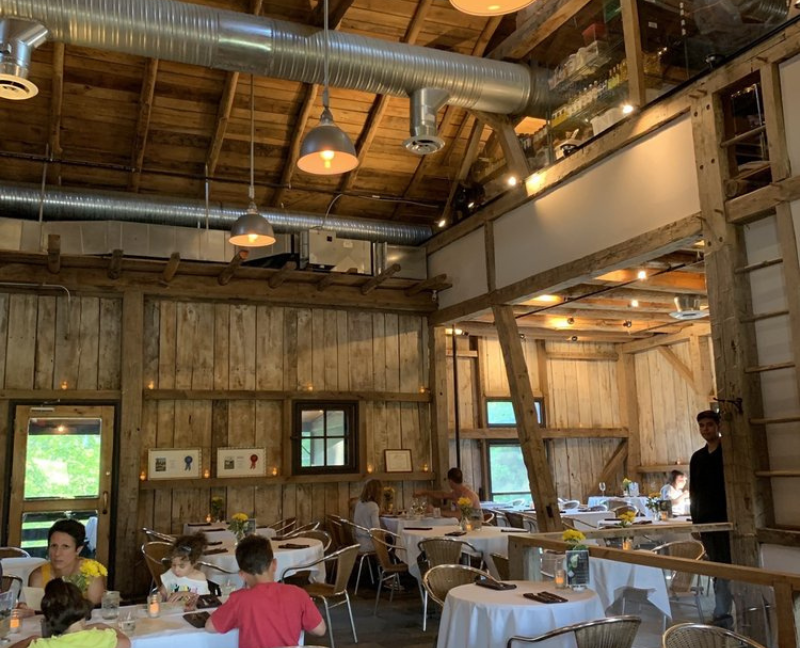
© Madison R | Yelp
2147 N. Talbott St., Indianapolis
On the menu are kid-friendly items like smash burgers, fried chicken, and milkshakes, but the best part of Baby's (from a child's point of view) is the fantastic kids’ play area on the patio.
While you wait for your food, they also provide magnet tiles for kids to play with.
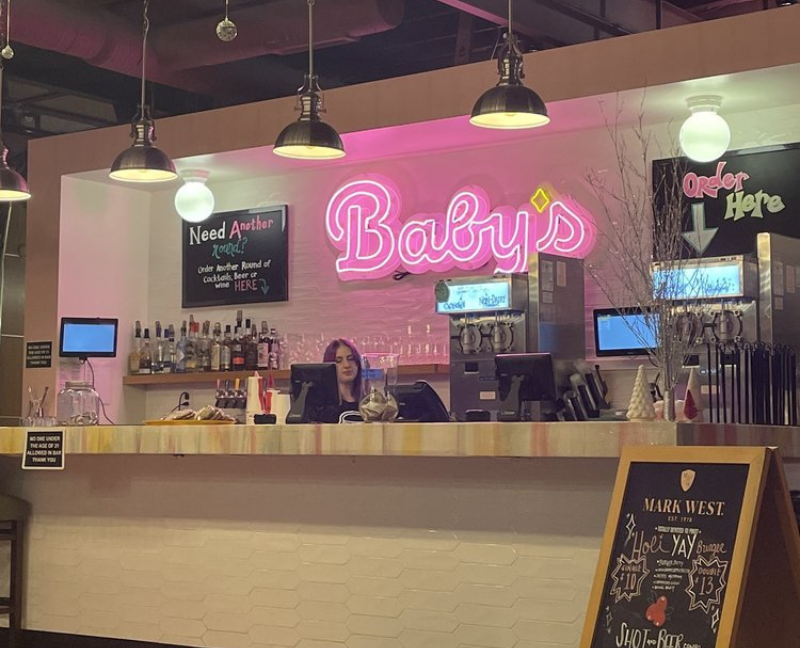
© Joe M | Yelp
350 Veterans Way, Carmel
Chicken tenders, burgers, and white mac & cheese are all available at Fork + Ale House. Yet the fact that it is located in the heart of Carmel's Midtown Plaza makes it really stand out.
If the weather is nice, select a seat on the patio of Fork + Ale House to be close to the outdoor ping pong tables, pool tables, and massive LED TV. While the kids play, parents may enjoy their lunch!
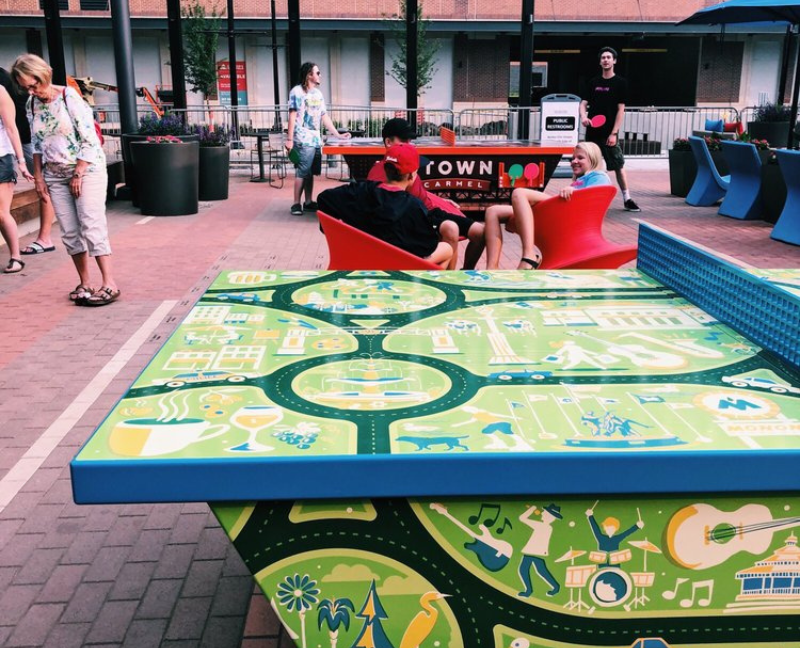 © Niki B | Yelp
© Niki B | Yelp
Did we miss anything? What’s your favorite family-friendly restaurant in Indiana?
Feel free to share your thoughts in the comments below!
Your choice of restaurant is crucial when dining with children.
Before your drinks even arrive at your table, a restaurant experience can go south if the atmosphere isn't enjoyable and welcoming to kids.
We're fortunate that there are lots of kid-friendly eateries in the greater Indianapolis area.
The good thing is that we know where to look, therefore we were able to find you some fantastic, entertaining eateries in Indianapolis!
303 E Main Street, Westfield
There are times when parents simply need a fantastic restaurant with amazing food and drinks where their kids can play nearby, such as Field Brewing.
This Westfield brewery includes a beautiful garden, outdoor patio seating, and a space where guests can play giant Jenga, bocce ball, or simply relax on the man-made turf.
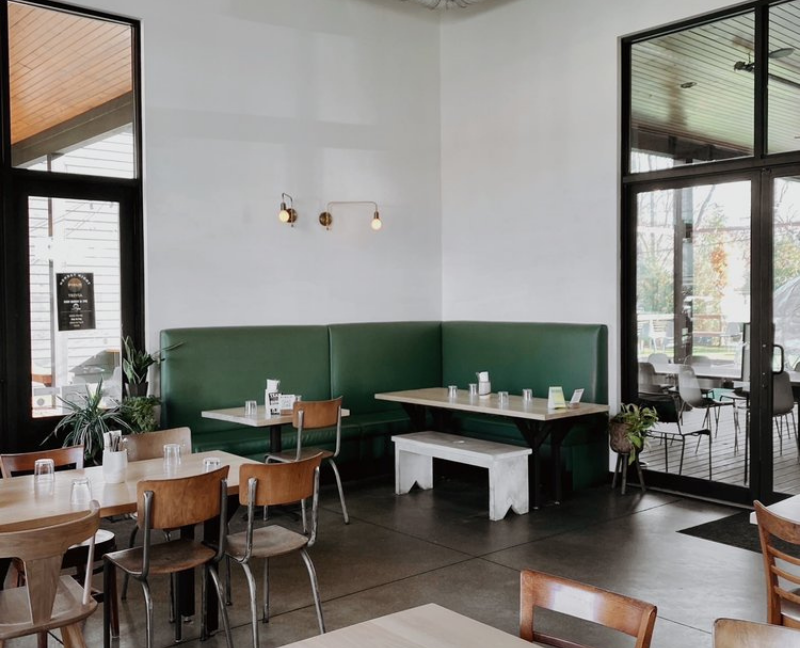 © Olivia S | Yelp
© Olivia S | Yelp
Multiple Locations
The ideal restaurant for a family night out is this one!
You may play hundreds of board games at your table, such as Chutes, Fact-Crap, or Zingo while enjoying some food, drink, and revelry.
And if reading is more your style, Books & Brews has a large selection of books that you can browse while dining or buy to take home.
Bonus: Books & Brews has numerous locations in the Indianapolis area, and each provides a day where kids eat free!
Below are the days and locations:

© Cynthia W | Yelp
5301 Winthrop Ave., Indianapolis
You should bring your half-pints to Half Liter Barbeque & Beer Hall.
This Broad Ripple establishment offers some of the best BBQs in Indianapolis, a sizable, open, relaxed, and family-friendly outside seating space.
Even if you're waiting for your food, you can play a game of cornhole!
Get Extra: Keep your kids (and inner child) happy by ordering a dessert from Dippin' Dots and Rice Krispie at Half Liter.
 © Kayla S | Yelp
© Kayla S | Yelp
13193 Levinson Lane, Noblesville
Ford's Garage, a restaurant that is decorated with Ford car parts and memorabilia, might appeal mostly to car enthusiasts (and kids who love vehicles).
Other than the genuine cars present within the restaurant, the establishment serves chicken, waffles, burgers, and more.
Before you leave the restaurant after having an appetizing dinner, turn right and you will notice a children's outdoor play area that is a part of the Hamilton Town Center outdoor shopping mall.
 © Tiff R | Yelp
© Tiff R | Yelp
Multiple Locations
Downtown Indy: 210 S. Meridian Street, Indianapolis
Carmel: 918 S. Rangeline Road, Carmel
Chicken, spaghetti, and OREO cookie shake? What else are you looking for? Their menu is like a paradise that you and your family will surely love.
All meals on The Old Spaghetti Factory's kid's menu include a dessert, either vanilla ice cream or spumoni, at the end of the meal.
If you want to have even more fun, ask to sit in the trolley car, which is an amusing feature in all OSF locations!
 © Kara M | Yelp
© Kara M | Yelp
These are just some of the best family restaurants you should try this weekend. In the next part, you'll find more food establishments for you and your kids.
A home purchase is not the same as signing a lease. Often, you sign a one-year lease when you rent a place.
If you want to avoid losing money on your property when you purchase a home and obtain a mortgage, you should be ready to commit for at least five years at a time. It turns out that the five-year commitment to homeownership offers many emotional and psychological advantages in addition to financial advantages.
So before you look for just listed homes for sale, here are the top 5 benefits you should consider:
A home purchase is not a quick investment. It is expensive to stay in a property for a period that is less than five years; most people plan to stay in their homes for ten to twenty years, and it's usually because of the up-front purchasing, closing, and mortgage fees. When you purchase a home with that goal in mind, you're more inclined to make investments in your neighborhood and property. You'll make an effort to get along with your neighbors better, volunteer, and take an active role in resolving issues when they arise.
Humans are social organisms that require close-knit networks to survive. Civic engagement, which is inherently motivated when you own a property, is the best method to cultivate these networks.
You'll experience less stress as a homeowner as long as your mortgage is manageable given your current financial circumstances.
Here are some of the reasons why:
According to studies, kids of homeowners typically do 9% higher in Math and 7% better in reading than kids of non-homeowners. Experts attribute that to the stability that homeownership brings to these kids' lives. Children thrive on regularity, so when they know what to anticipate, connect with the same friends, and experience the same environment—like your neighborhood—they feel less stress, and when they feel less stress, they perform better in school.

Who doesn't want their child or children to act more appropriately? According to studies, children of homeowners experience 1-3% fewer behavioral issues than children of renters. The stability that the young ones experience when their parents own their home as opposed to the potential unpredictability that comes with renting is what the researchers attribute their findings to. Researchers have found a link between parents' happiness and their kids' happiness, so if you're less stressed, your kids' stress levels will be too.
Renting generally means residing in someone else's house. As a result, not all elements of your surroundings are under your control. You have no control over, for instance, the chemicals your landlord puts on the apartment's landscaping or the materials they choose to use inside. Moreover, most landlords don't keep up with termites, rodents, or mold issues.
But, you have total authority over every choice made about your property when you own your own house. You can choose non-toxic building supplies and fertilizer, take care of bugs and mold, and other issues before they become a problem. You may create the kind of healthful environment you want in your house.
Although the financial advantages of homeownership are occasionally contested, they are widely established. You may not have thought about the emotional and psychological advantages of having a secure living situation, such as a fixed mortgage payment and the ability to completely manage your surroundings, that comes with home ownership.
These benefits might be more significant than any tax deductions or monetary gain you might experience.
If you're ready to begin your journey to owning your home or learn more about this process, our team at RE/MAX Advanced Realty is happy to help!
Give us a call at 317-298-0961 today!
Not only is buying a home exhilarating, but it's also one of life's greatest accomplishments. There are many advantages to having your own property, even though it might be difficult at some point.
Renting, on the other hand, can be a terrific short-term option for deciding where you want to live and for accumulating funds for your down payment on a home loan.
So, which one should you choose?
In this post, we’ll help you decide whether having a home or renting out is for you.
There are several benefits of renting a home, some of which include:
Flexibility: Renting a home offers a great deal of flexibility as you are not tied down to a long-term commitment. Most rental agreements are for a fixed period, after which you have the option to renew or move to another location. This makes renting a great option for those who frequently change jobs or move frequently.
Lower Upfront Costs: Renting a home requires a lower upfront cost compared to buying a home. You typically only need to pay a security deposit and the first month's rent, whereas buying a home requires a down payment, closing costs, and other expenses.
No Maintenance Costs: When you rent a home, the landlord or property manager is responsible for any maintenance and repairs. This means that you don't have to worry about unexpected expenses related to repairs, which can be a significant benefit.
Access To Amenities: Many rental communities offer access to amenities such as swimming pools, fitness centers, and laundry facilities. This can be a great perk for those who want to enjoy these amenities without having to pay for them separately.
No Property Taxes: As a renter, you are not responsible for paying property taxes. This can be a significant benefit as property taxes can be a significant expense for homeowners.
No Need To Worry About Resale Value: When you rent a home, you don't have to worry about the resale value of the property. This can be a great benefit if you are not interested in investing in real estate or if you don't want to deal with the stress of selling a property.

Increasing Equity: The value of the property you own represents your equity. When you pay off your mortgage or when the market value of your property rises, equity might naturally increase. Making additional mortgage payments can also help it grow.
If you've made additional payments to your loan, you may be able to redraw it or refinance for a cash-out. The money can then be utilized for remodeling, purchasing a new vehicle, or even as a down payment for a different home.
Living Security: The landlord, who may decide they no longer wish to rent out their property, is in charge of your position when you rent. Relocating is expensive, inconvenient, and emotional, to say nothing of all three. When you own your own house, you can rest easy knowing that you get to choose when to relocate.
Build The Home Of Your Dream: You can opt to completely redo the bathroom with a jungle theme or to paint the walls in vibrant colors without worrying about getting your bond back when you own your own property, giving you total creative freedom. House upgrades can raise a property's value, thus every dollar that your house has appreciated will be yours if you decide to sell. Get our guide to getting your home renovation off the ground.
Cost Management: Your rent may be increased regularly if you rent. While owning a home entails a variety of costs, including mortgage payments, council fees, and strata or property insurance, these costs are not likely to increase significantly overnight.
By selecting a fixed-rate home loan, you might in some cases even be able to keep your rates under control.
Save Cash: Although it may not seem like it, you might save money by making your mortgage payments. Many repayments combine principle and interest, allowing you to contribute some funds to expanding your home's ownership. Although renting could appear to be less expensive, you won't eventually get any of that value back.
Nonetheless, it has its own pros and cons. If you want to learn more about it, feel free to click this link or subscribe to our mailing list.
Thank you!
Your pets might be prepared to begin an exciting new chapter in a new home, but what about you? Even while some animal family members might find it upsetting to relocate to a new location, there are ways to help them adjust with a little forethought.
For homeowners, coexisting peacefully with pets is of utmost importance. According to the American Pet Products Association's APPA National Pet Owners Survey, at least one pet is owned by 70% of all U.S. households or around 90.5 million people. This is an impressive number that affects several economic sectors, including residential real estate.
Today's house buyers are looking for properties that represent how much people adore their pets. Some homebuyers find it easy to select a pet-friendly real estate in Indiana by choosing a residence with hard flooring, a fenced yard, or a litter box.
Some pet-friendly home plans accommodate the canine members of the family.
Under-cabinet feeding stations, pet wash stations, and built-in crates, beds, or pet suites are some of the more well-liked custom elements of today.
Electronic pet doors and security cameras with remote access, which enable homeowners to keep tabs on their pets while they're away, are two more high-tech smart home additions that are in hot demand.

For pet owners, location matters.
Being close to an enormous nature trail away from crowded streets or an off-leash dog park is an added advantage, and living in a pet-friendly community is a need.
Also, although school districts are typically the main priority for parents of young children, some pet owners also search for homes close to their veterinarian, boarding house, and dog daycare.
Give your animals a tour of the new residence. Decide where the toys, bed, and water dish for your pets will go, then take them on a home tour to acquaint them with their new surroundings.
Make sure to check the house for potential safety risks before letting them explore and find new smells and favorite areas.
Start your cat off in a smaller area and give them time to explore; cats might feel better at ease acclimating to one room at a time.
When you follow this advice and maintain your pets' regular feeding and walking schedules, adjusting to a new house is simple. In the comfort of your new home, they should continue living their normal, happy lives with little to no interruption.
For more content like this, feel free to browse our website today.
Downsizing and planning to reduce the clutter in your new house? These tips will help you not only organize your space but also, preserve the memories.
A new home move is frequently bittersweet. You are both happy to leave your familiar surroundings and sad to make a change. A smaller space means you won't have room for all of your current possessions, making downsizing even more difficult.
But, downsizing can also be a chance for renewal and a fresh start. You may make your new property feel like home by furnishing it with the things you truly love if you clear out the clutter.
So, if you’re wondering what is the best way to downsize a home, here are three tips for downsizing without giving up your priceless possessions.
Visit your new residence and gauge the dimensions of your rooms and storage spaces. You can use this as a guide to determine how much you can bring. It is preferable to undervalue than to overvalue.
One room at a time as you decide what to keep and what to throw away. You don't have to complete the entire moving process at once. To avoid feeling rushed, schedule a small bit of work each day and provide additional time.
Make your furniture selection first. You'll have a better understanding of how much room you still have to fill if you go from big to little. If you can't carry that bookcase with you, you don't want to have to rearrange everything.
One question you should ask yourself when sorting your belongings is this -- are you going to use it or not?
You can convince yourself that one day, you're going to wear that beautiful dress but if it's been 12 months and you haven't used it, it's unlikely you ever will.
Get rid of duplicates as well. How many china sets or coffee makers do you have? You don't need to keep both if you can only utilize one at once.
Follow a strict yes/no rule while sorting; "maybes" are not permitted. Create two piles: one for "yes" and one for "no," and make yourself pick one. "Maybe" piles only result in more work for you later if you aren't persuaded that the item deserves a yes.
Choose how to distribute your "no" list. These things may not be what you want or need right now, but someone else might find them beneficial. It's possible to pass special objects down to friends and family. You might sell good-condition furniture, household goods, clothing, and other items through a garage sale or on websites like Craigslist.
Alternatively, you can opt to give reusable items to charities like Goodwill, who occasionally offer neighborhood or even household pickups, making your chore even easier. Everything that is beyond repair should be taken to the landfill or the recycling center.

To reduce space and make sharing with family members easier, digitize your images.
How often do you actually go to photo albums, considering how much space they take up?
Create a slideshow screensaver for your TV or computer, or simply pick up a digital frame to watch all of your photographs in a rotating slideshow.
Objects that bring back pleasant memories but that you no longer have room for should be photographed. Even if you don't keep the objects, you can reflect on the memories.
Transferring your prized possessions to your children, grandchildren, or close friends will ensure that they are in excellent hands. They'll adore the gift, and you get to enjoy seeing them use the stuff.
Giving relics a new purpose is another tactic. If you enjoy crafting, you can keep a record of your experiences by using objects like old movie tickets, letters, and photos in a scrapbook. Alternatively, create three-dimensional artwork by employing shadowboxes. It will be simpler than ever to enjoy your memories if you collect them all in one location.
A difficult procedure is downsizing. You will find stuff you haven't seen in a long time, and you'll need to decide what to do with them. Give yourself some time to think back, and then choose. Take in mind the space you have available. Take what is actually valuable with you; only you know what you cannot live without.
Imagine being able to relax in your new location once your move is complete and you are surrounded by a sense of familiarity.
These are just some tips when downsizing a home; if you have more, feel free to drop them in the comment section below.
Thank you!

8313 W. 10th St
Indianapolis IN 46234
dennis@indyhomepros.com
317-316-8224